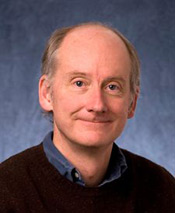UW-Madison researcher Thomson wins prestigious Albany Prize
In recognition of his pioneering work in isolating human stem cells and the promise they hold for the future of medicine, University of Wisconsin–Madison researcher James Thomson has been named a co-recipient of the 11th annual Albany Medical Center Prize in Medicine and Biomedical Research.

Thomson
Photo: Courtesy Morgridge Institute for Research
Thomson, director of regenerative biology at the Morgridge Institute for Research and a University of Wisconsin–Madison scientist since 1994, often is considered the founder of stem cell science due to his groundbreaking discoveries of primate and human embryonic stem cells, made in 1995 and 1998.
“I am delighted to be selected for the Albany Medical Center Prize. It is an honor to share this year’s prize with such talented co-recipients and to join the ranks of the many distinguished scientists selected for the award over the past decade,” says Thomson, who believes the rapid pace of stem cell science will continue to accelerate.
James J. Barba, president and chief executive officer of Albany Medical Center and chairman of the National Selection Committee, announced the prize winners today (March 16). Thomson’s co-recipients are stem cell researchers Elaine Fuchs, a Howard Hughes Medical Institute Investigator at The Rockefeller University, and Shinya Yamanaka, of Kyoto University and the Gladstone Institute of Cardiovascular Disease. The scientists will receive the prize on May 13 during a celebration in Albany, N.Y. The $500,000 prize is the largest award in medicine and science in the United States.
According to Robert Golden, dean of the UW–Madison School of Medicine and Public Health, “Dr. Thomson’s work over the last decade has been integral to establishing human ES cells and human iPS cells as standard model systems for understanding the development and function of the human body both in terms of its composite systems and as an integrated whole.”
Morgridge Institute for Research executive director Sangtae “Sang” Kim says, “We are very proud of Jamie and his selection for the Albany Prize. He is a brilliant, focused and extremely disciplined scientist who has built one of the most productive and talented research teams working today. We are privileged to work with him.”
In addition to the Albany Prize, Thomson and Yamanaka have been co-recipients of two other prestigious research awards, the Massry Prize in 2008, and the 2011 King Faisal International Prize in Medicine, presented to the researchers just three days ago in Saudi Arabia.
Citing diabetes, Parkinson’s, cancer and spinal cord injury as examples, the Albany Medical Center’s announcement stated that “Collectively, the work of Drs. Fuchs, Thomson and Yamanaka has paved the way toward realizing the vast potential of stem cells to treat or reverse diseases and conditions, as well as to help society better understand how human tissues develop and function.”
The Albany Medical Center Prize was established in 2000 by the late Morris “Marty” Silverman to honor scientists whose work has “demonstrated significant outcomes that offer medical value of national or international importance.” A $50 million gift commitment from the Marty and Dorothy Silverman Foundation provides for the prize to be awarded annually for 100 years.
Thomson and Yamanaka are credited with their simultaneous but independent discoveries reported in 2007 for genetically reprogramming adult human cells back to an embryonic state. This discovery was hailed as a major scientific breakthrough with the potential to speed stem cell research by offering a complementary or alternative approach to using embryonic stem cells. Fuchs is recognized for her work in discovering the genetic bases of human skin disorders, including cancers, and reverse genetics techniques that have made stem cell and genetic research easier for all scientists.
“The problems in science are so complex today that only through collaboration, and sharing skills and knowledge across every discipline in medicine, can we make the breakthrough discoveries that lead to widespread improvements in human health,” Thomson says. “Stem cells can help us find the root cause of disease, so we can prevent it and hopefully reverse its course and repair damage. They also serve as important new tools for testing drugs at the human cellular level, offering a more efficient and effective model for determining human response and also reducing reliance on animal testing.”
Thomson joined the Morgridge Institute for Research as director of regenerative biology in 2008 as the first member of the new institute’s scientific leadership team. He maintains his faculty position as professor of anatomy at the UW–Madison School of Medicine and Public Health and also serves as co-director of regenerative biology for University of California, Santa Barbara’s Center for Stem Cell Biology and Engineering.
The Morgridge Institute is the private, nonprofit biomedical research organization that is a partner in the Wisconsin Institutes for Discovery, a unique public-private initiative created under one roof to facilitate interdisciplinary research and breakthrough discoveries to improve human health. Along with its public twin, the Wisconsin Institute for Discovery, the Morgridge Institute shares an innovative facility on the UW–Madison campus, consistently ranked as one of the best-funded public research universities in the U.S.



